The Ellmann Lectures return with ‘Writing Lives’ from March 3-5
Emory University | Feb. 12, 2024
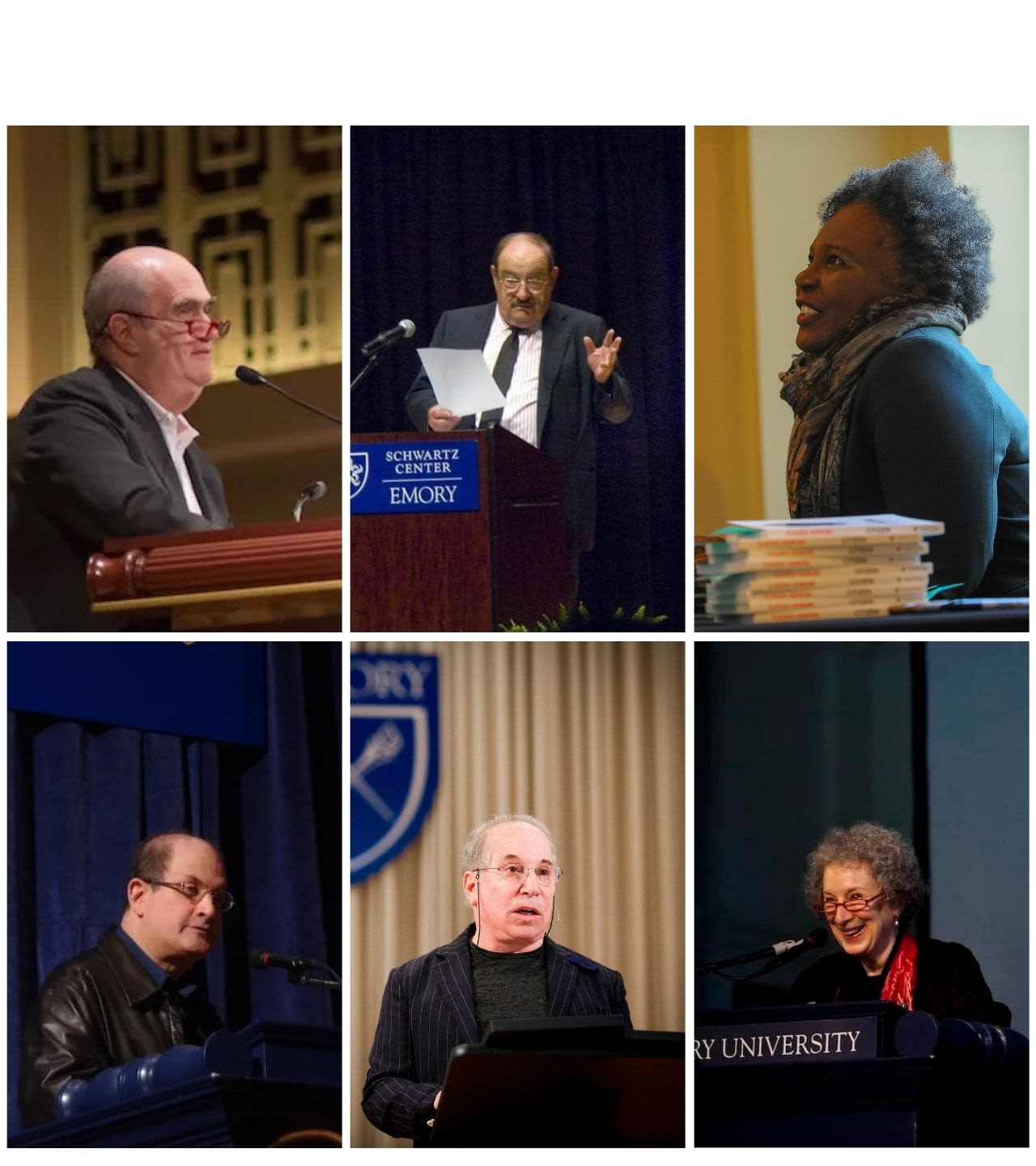
Those who appreciate literature’s ability to move, challenge and delight readers have some place important to be — the Schwartz Center for Performing Arts — from March 3-5.
The Richard Ellmann Lectures in Modern Literature resume with the arrival of poet Natasha Trethewey and writer Fintan O’Toole. Their lectures will commemorate the 10th anniversary of the death of Nobel Prize–winner Seamus Heaney, the inaugural Ellmann Lecturer, by deepening the love of words both spoken and written.
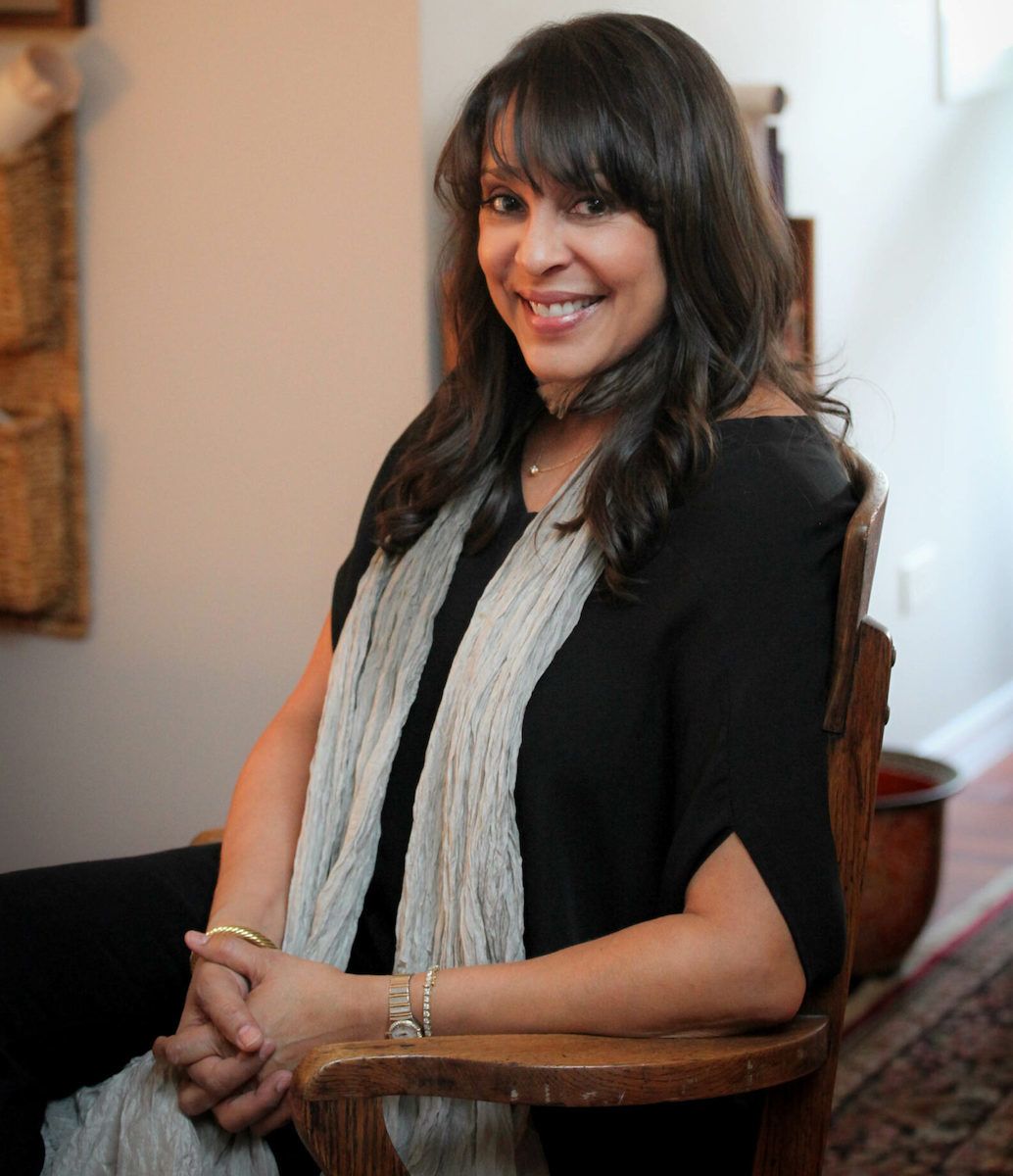
Natasha Trethewey won the Pulitzer Prize in Poetry, is a previous U.S. Poet Laureate and a former Emory faculty member.
Trethewey and O’Toole have significant scholarly connections to Heaney and will lecture on the theme “Writing Lives,” examining the intersections of art, life and writing.
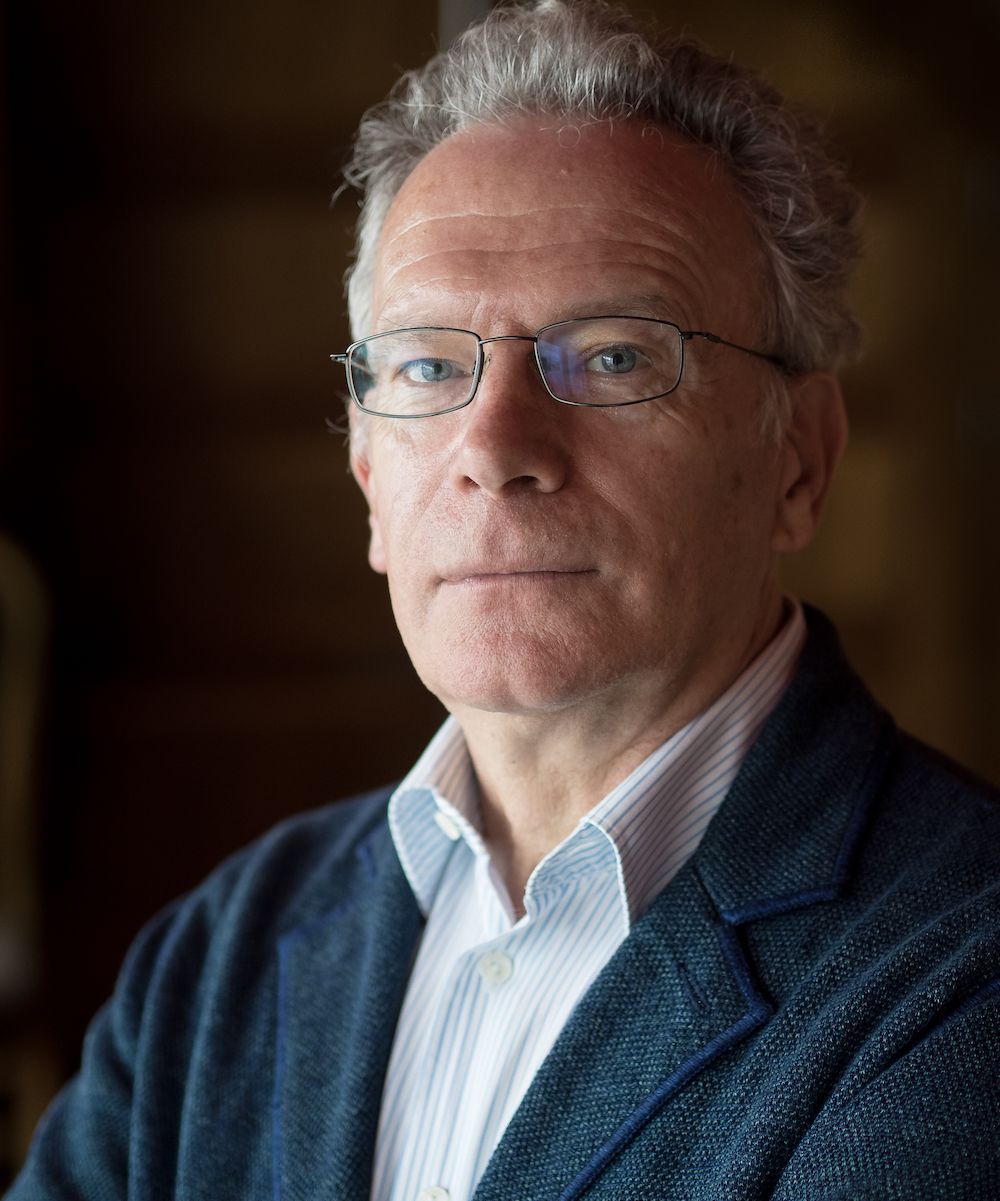
Irish Times columnist Fintan O’Toole will author the official biography of Seamus Heaney.

Natasha Trethewey won the Pulitzer Prize in Poetry, is a previous U.S. Poet Laureate and a former Emory faculty member.
Natasha Trethewey won the Pulitzer Prize in Poetry, is a previous U.S. Poet Laureate and a former Emory faculty member.

Irish Times columnist Fintan O’Toole will author the official biography of Seamus Heaney.
Irish Times columnist Fintan O’Toole will author the official biography of Seamus Heaney.
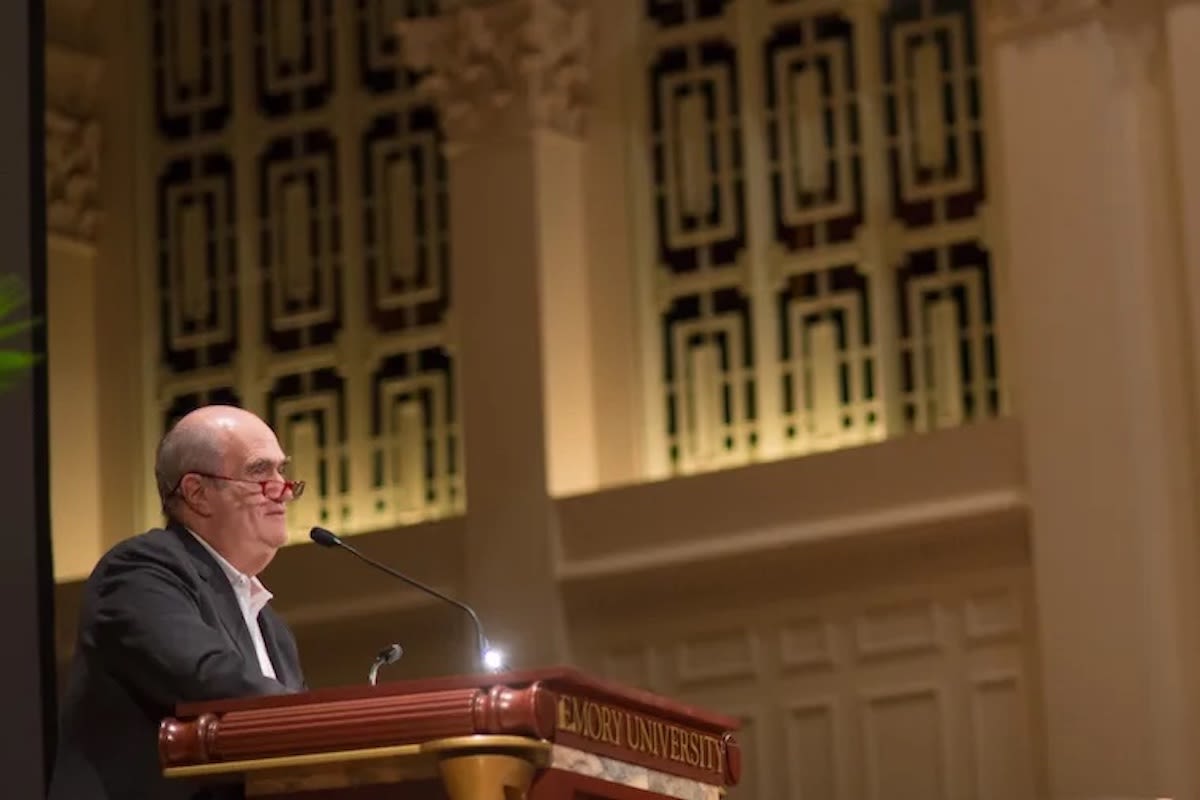
In 2017, Colm Tóibín explored literary fathers and sons in the Wilde, Yeats and Joyce families, illuminating the modernist triumvirate so central to Richard Elllmann, for whom the series is named.
In 2017, Colm Tóibín explored literary fathers and sons in the Wilde, Yeats and Joyce families, illuminating the modernist triumvirate so central to Richard Elllmann, for whom the series is named.
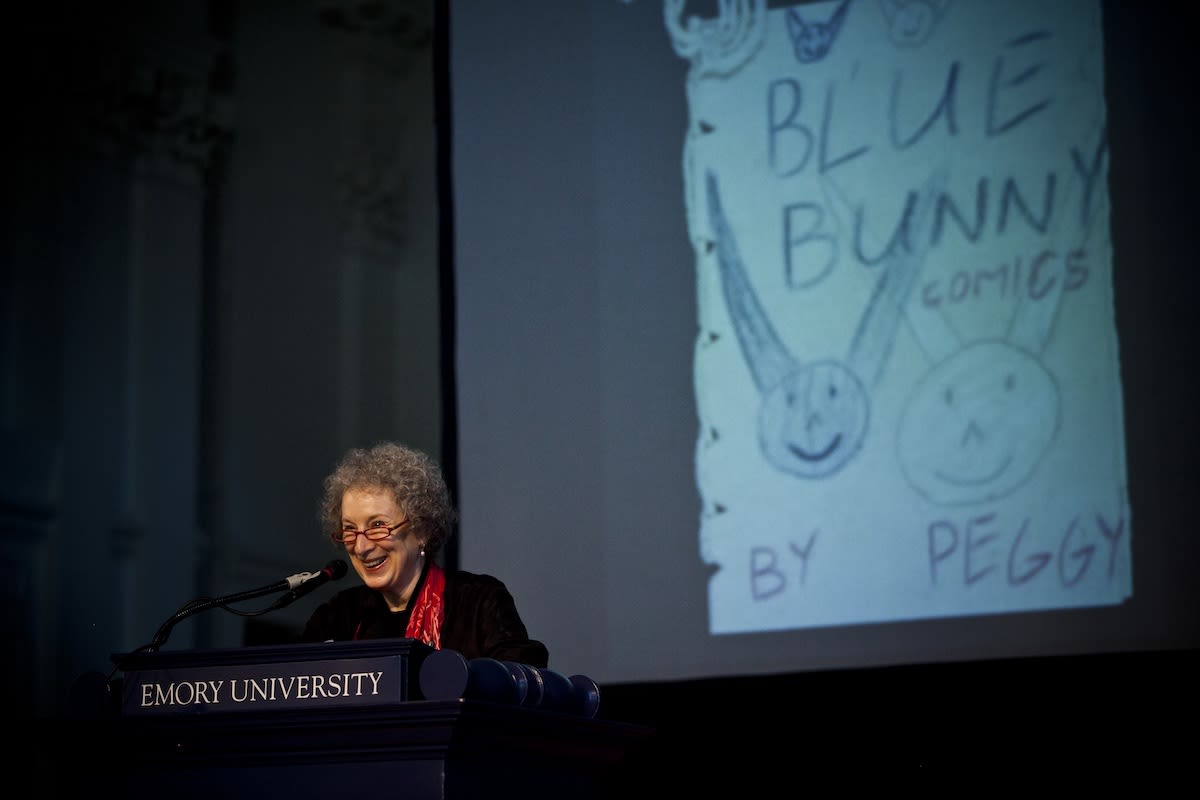
Perhaps best known as the author of "The Handmaid's Tale," Margaret Atwood lectured about speculative fiction in 2011, combining incisive argument about the genre with great fun, sharing Bunny Land and Mischief Land — worlds she created with her brother.
Perhaps best known as the author of "The Handmaid's Tale," Margaret Atwood lectured about speculative fiction in 2011, combining incisive argument about the genre with great fun, sharing Bunny Land and Mischief Land — worlds she created with her brother.
This year’s speakers join a vaunted tradition
The list of past distinguished Ellmann Lecturers includes Seamus Heaney, Denis Donoghue, Helen Vendler, Henry Louis Gates Jr., A.S. Byatt, David Lodge, Salman Rushdie, Mario Vargas Llosa, Margaret Atwood, Paul Simon, Colm Tóibín and Claudia Rankine.
The new home for the Ellmann Lectures is the Fox Center for Humanistic Inquiry. Named director in 2023, Carla Freeman is the Goodrich C. White Professor of Women’s, Gender and Sexuality Studies and former interim dean of Emory College of Arts and Sciences.
“I couldn’t be more thrilled to be relaunching the Ellmann Lectures and making the Fox Center their home. The Ellmann tradition is a signature Emory experience in which we come together as a community, relishing the power and beauty of poetry and literature. I vividly recall the whimsy and foreboding of Margaret Atwood’s lectures and the enduring echoes of Salman Rushdie’s. I know that Natasha Trethewey and Fintan O’Toole will stir us all,” says Freeman.
The Ellmann Lectures
Sunday, March 3, 4-5 p.m., Natasha Trethewey
“The House of Being: Why I Write”
Monday, March 4, 6:30-7:30 p.m., Fintan O’Toole
“Crediting Marvels: Experience, Imagination and the Biographer’s Dilemma”
Tuesday, March 5, 6:30-7:30 p.m., Creativity Conversation
Natasha Trethewey, Fintan O’Toole and Geraldine Higgins
Book sales and signing will follow each event. Tickets are free but required through the Ellmann Lectures site.
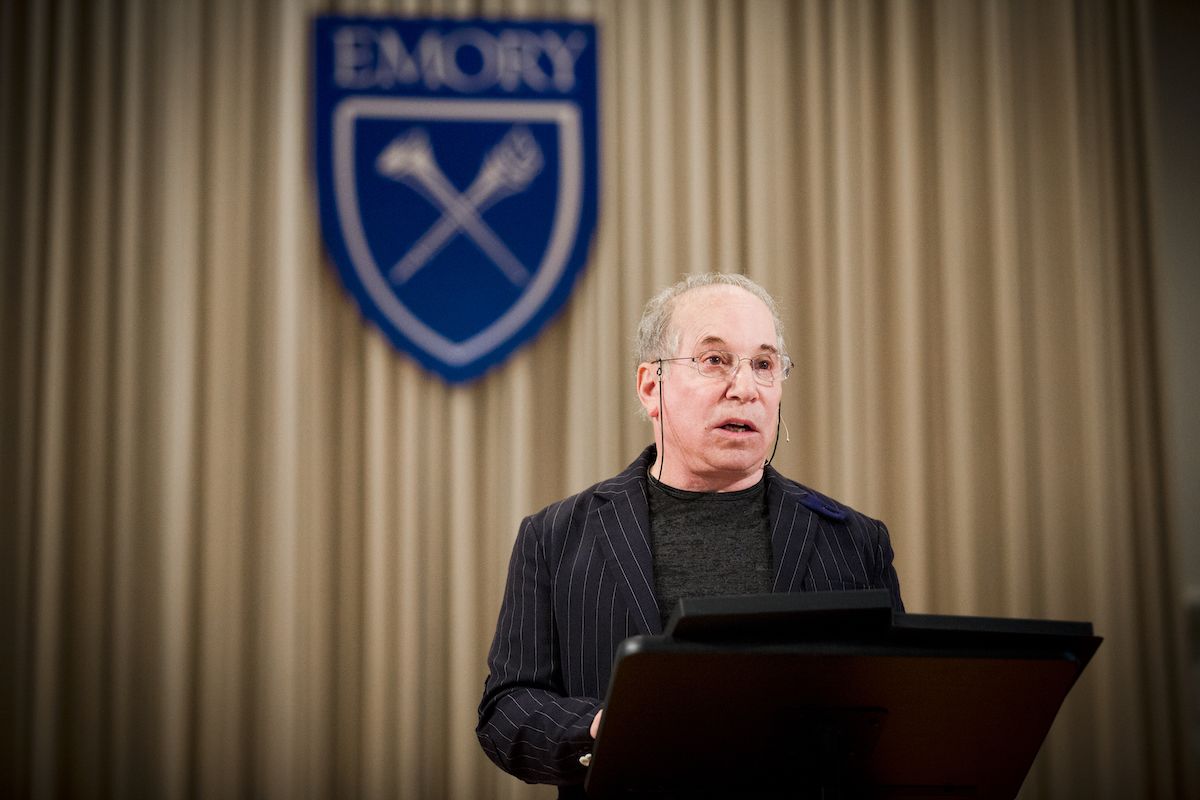
In 2013, singer and songwriter Paul Simon shared insights into his career, which has spanned 50 years and featured music that has touched generations.
In 2013, singer and songwriter Paul Simon shared insights into his career, which has spanned 50 years and featured music that has touched generations.
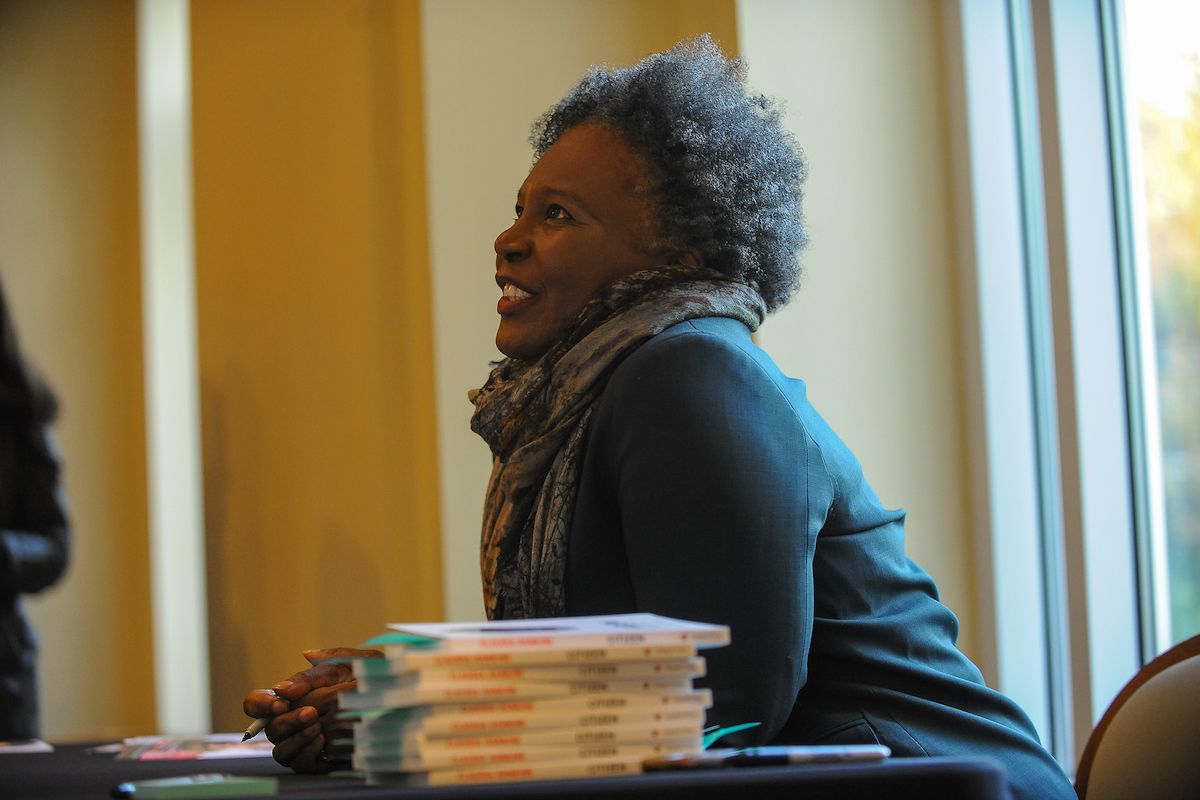
Yale professor and poet Claudia Rankine was the 2019 Ellmann Lecturer, delivering talks titled “A History of Olympia’s Maid in Contemporary Poetry” and “Poets Engaged with Nationalism, Borders and Belonging.”
Yale professor and poet Claudia Rankine was the 2019 Ellmann Lecturer, delivering talks titled “A History of Olympia’s Maid in Contemporary Poetry” and “Poets Engaged with Nationalism, Borders and Belonging.”
The director for the lectures is Geraldine Higgins, associate professor in the Department of English and director of Emory’s Irish Studies Program. “The Ellmann Lectures really celebrate what Emory is and what the humanities can do,” she says.
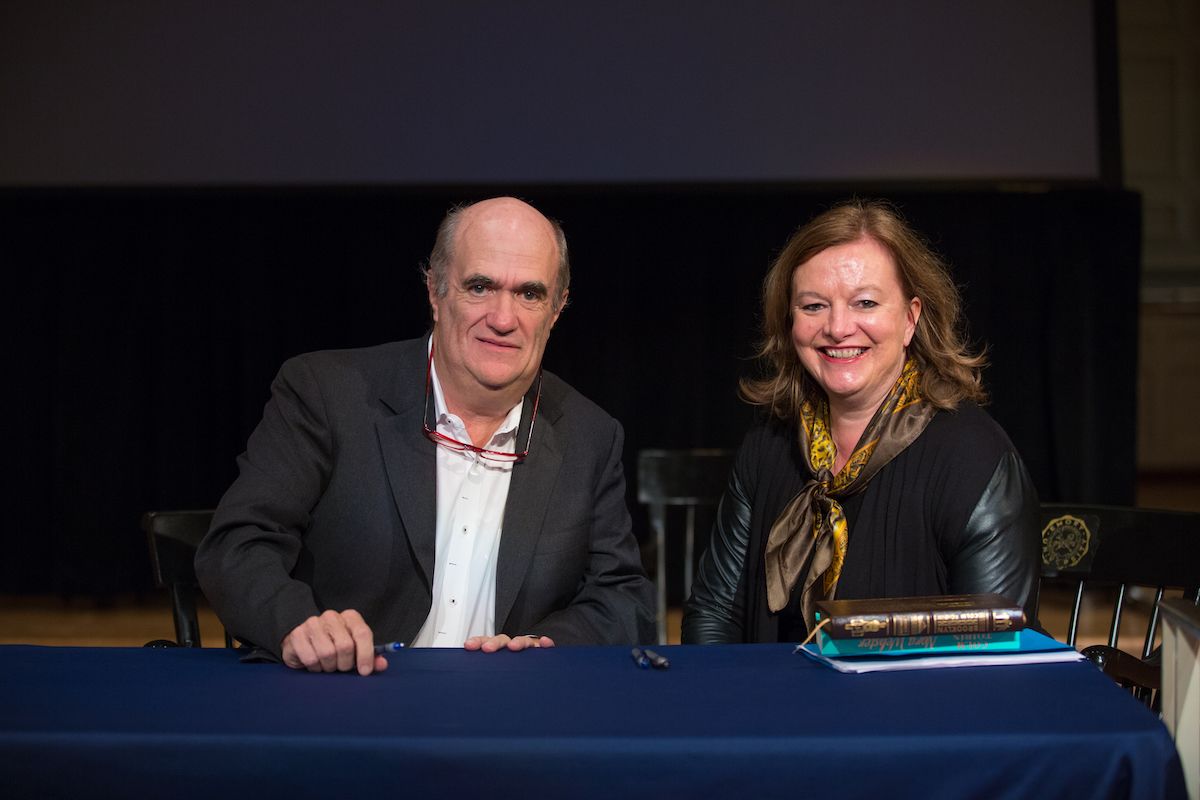
Irish writer Colm Tóibín, shortlisted twice for the Booker Prize, and Emory professor Geraldine Higgins enjoy a moment. Higgins has guided the appearance of three Ellmann Lecturers, including this year’s guests, Natasha Trethewey and Fintan O’Toole.
To honor all that Heaney did to vault an upstart lecture series into international prominence, Higgins sought out two scholars for this year’s lectures who acknowledge an enormous debt to the poet.
Trethewey is Board of Trustees Professor of English and director of creative writing at Northwestern University. As the Robert W. Woodruff Professor of English and Creative Writing, Trethewey spent 15 years on the Emory faculty, departing in 2016. While here, she won the Pulitzer Prize in Poetry in 2007 for her collection “Native Guard.” As she composed that collection, Trethewey read drafts of Heaney’s poem “North” in Emory’s Stuart A. Rose Manuscript, Archives, and Rare Book Library and in partial response wrote the poem “South.”
She was selected in 2012 as the 19th U.S. Poet Laureate and was asked to serve a second term in 2014. In 2020, Trethewey published “Memorial Drive: A Daughter’s Memoir” about her mother’s murder by her former stepfather and the influence of her mother’s life and death on the artist she became.
“I am looking forward to returning to Emory for the Ellmann Lectures. I have fond memories of attending them years ago when I got to see Salman Rushdie and Mario Vargas Llosa,” Trethewey notes.
For his part, O’Toole — a leading figure in Irish letters and a public intellectual of international stature — was commissioned in 2017 by Heaney’s longtime publisher, Faber, as Heaney’s official biographer. He is a columnist for The Irish Times and advising editor at the New York Review of Books. A member of the Royal Irish Academy, O’Toole was for several years the Leonard L. Milberg ’53 Visiting Professor in Irish Letters at Princeton University. His most recent book, “We Don’t Know Ourselves: A Personal History of Modern Ireland,” was named one of the 10 best books of 2022 by The New York Times.
“Emory is a wonderful center for learning in the humanities and a place where scholarship and creativity can be in constant conversation with each other,” says O’Toole. “The towering presence of Richard Ellmann continues to inspire those conversations. It’s especially apt that we can do that this year under the benign auspices of Ellmann’s friend Seamus Heaney.”
In his lecture, O’Toole will address questions the biographer of a great artist must face. “How do you illuminate the work without taking away its essential mystery? As scholars, we want to know everything, but as readers we are thrilled by the sheer wonder of the unknowable,” he says.

Irish writer Colm Tóibín, shortlisted twice for the Booker Prize, and Emory professor Geraldine Higgins enjoy a moment. Higgins has guided the appearance of three Ellmann Lecturers, including this year’s guests, Natasha Trethewey and Fintan O’Toole.
Irish writer Colm Tóibín, shortlisted twice for the Booker Prize, and Emory professor Geraldine Higgins enjoy a moment. Higgins has guided the appearance of three Ellmann Lecturers, including this year’s guests, Natasha Trethewey and Fintan O’Toole.
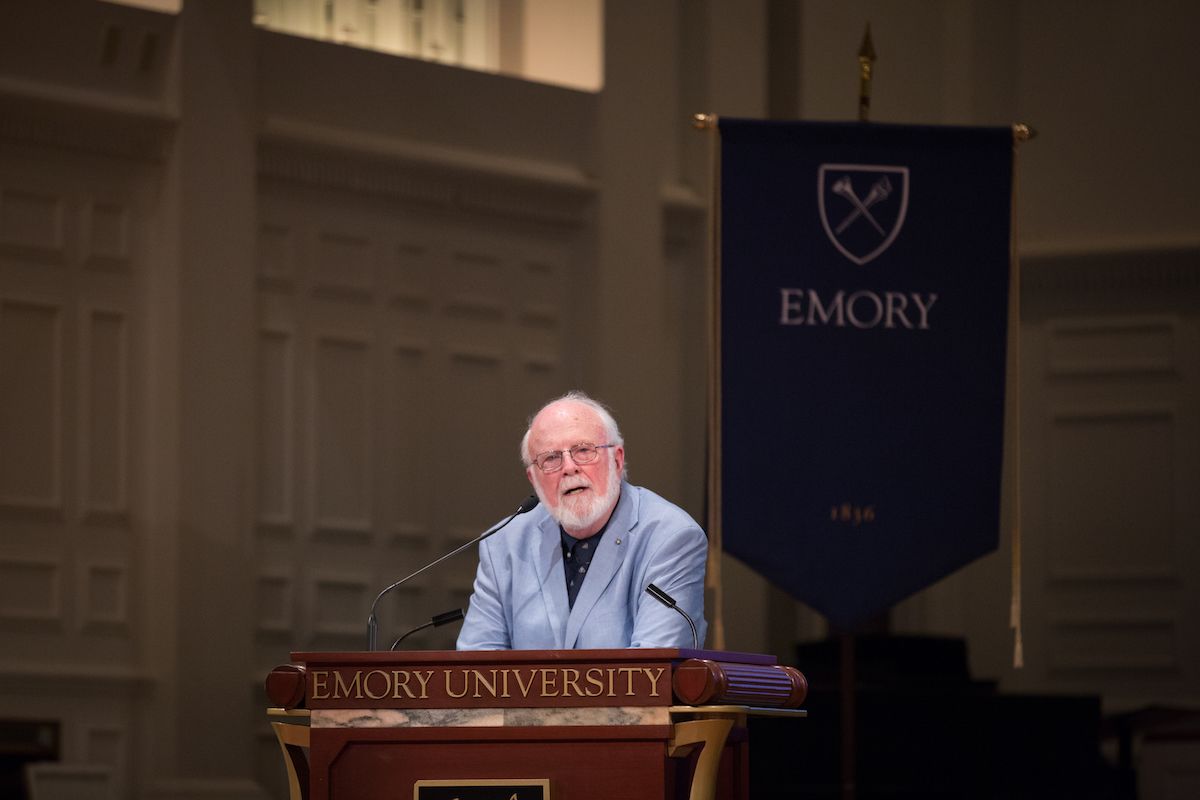
Ron Schuchard, professor of English, emeritus, is the founder of the Ellmann Lectures, which he oversaw for two decades, beginning with the 1988 lecture of poet Seamus Heaney.
Ron Schuchard, professor of English, emeritus, is the founder of the Ellmann Lectures, which he oversaw for two decades, beginning with the 1988 lecture of poet Seamus Heaney.
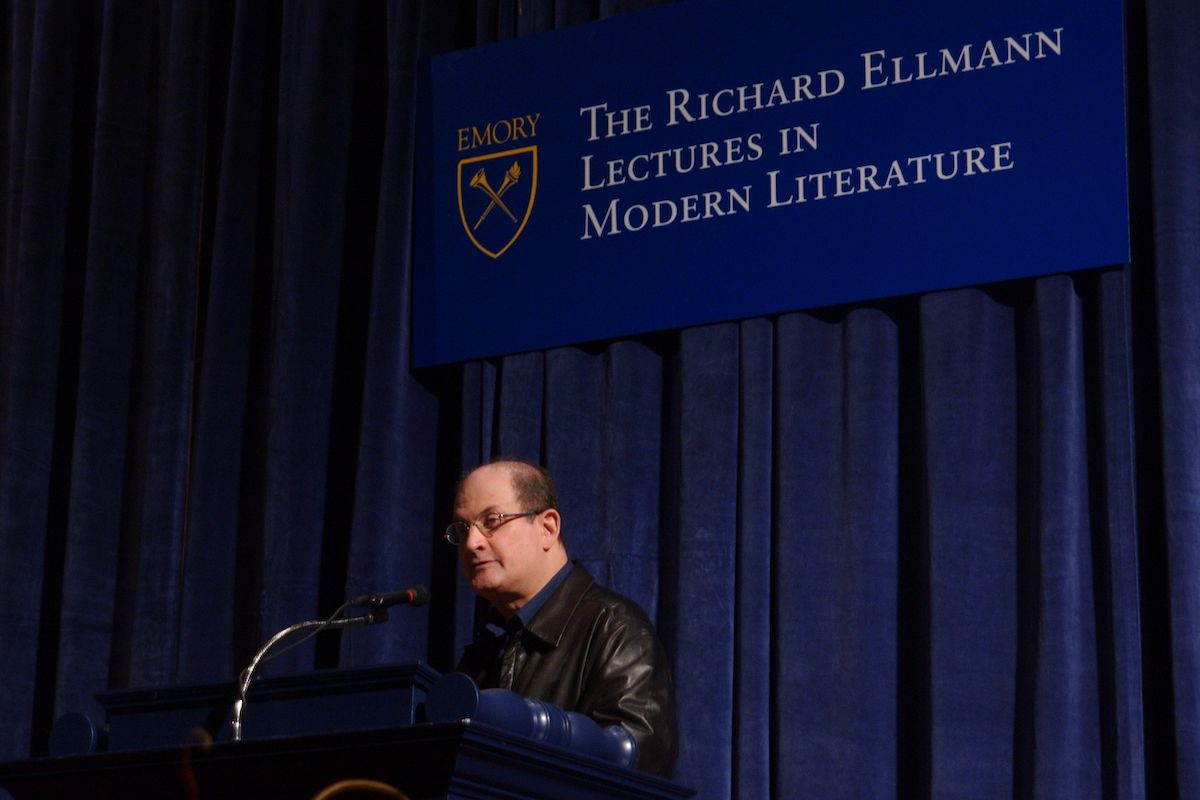
Serendipity came of novelist Salman Rushdie’s Ellmann Lectures in 2004. He gave his papers and computer files to the Rose Library and accepted an academic appointment that had him in Emory’s midst for nearly a decade.
Serendipity came of novelist Salman Rushdie’s Ellmann Lectures in 2004. He gave his papers and computer files to the Rose Library and accepted an academic appointment that had him in Emory’s midst for nearly a decade.
Naming the lectures for Richard Ellmann
“When I proposed the lecture series, I told then-President James Laney that everything associated with the lectures had to be first-class. We did not need to be extravagant, but we needed the support to make this unlike any other lecture series in the world.”
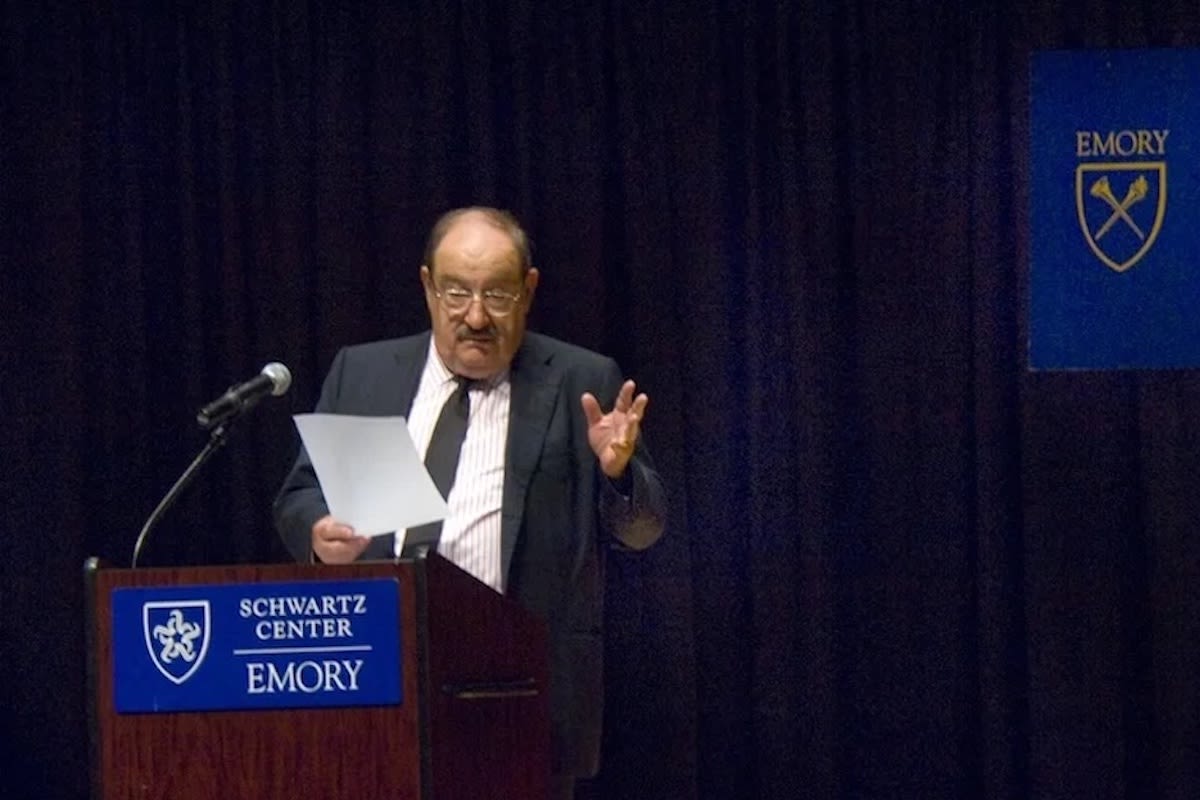
The novelist, philosopher and cultural critic Umberto Eco visited in 2008. When Ellmann Lectures founder Ron Schuchard extended the invitation, he feared it was a longshot. But Eco replied: “Of course I am coming. I owe Richard Ellmann such a tremendous debt.”
Those are the words of Ron Schuchard, Goodrich C. White Professor of English, Emeritus, the founder and longtime director of the Ellmann Lectures. Though the lectures are a youngish 35 years old, Schuchard — in just two decades — gave them standing on a par with the world’s great lectureships, some of which are now in their second century, including the Clarendon Lectures at University of Oxford, the Clark Lectures at Cambridge University and the Norton Lectures at Harvard University.
Upon his arrival at Emory in 1969, Schuchard wanted to improve the university’s special collections and standing in the humanities. He was a great admirer of Richard Ellmann, the celebrated biographer of W. B. Yeats, James Joyce and Oscar Wilde. About six years into Schuchard’s tenure, a colleague at a Texas institution called, saying that Ellmann had lectured there and was on his way to Atlanta to visit his son — but just for a day.
“Would you like to have him lecture at Emory?” the colleague asked. Though it was 10 p.m. on a Sunday, Schuchard rang Emory College Dean John Palms and breathlessly rattled off this request:
“The Goldsmiths’ Professor of English Literature at University of Oxford, the highest chair there, is coming here tomorrow for one day. I don’t know the name of his lecture and don’t have a place for him to speak, but if you give me $300 for an honorarium, I promise that we will put him on stage tomorrow night.”
Palms responded: “This is such an unusual request, I am going to say yes.”
In a pre-internet age, Schuchard and his rapidly deputized helpers made use of flyers, phone calls and radio announcements. Within 24 hours, Schuchard had reserved space in the law school and attracted 400 people to Ellmann’s lecture on Oscar Wilde.
In the course of ongoing conversations, Schuchard asked Ellmann to consider joining the Emory faculty. Once all the details fell into place, Ellmann was named the university’s first Woodruff Professor; he would spend each spring here from 1978 until his death in 1987.
When Ellmann was in his final decline from amyotrophic lateral sclerosis, Schuchard urged Laney to talk with him about establishing a lecture series in his name. Laney flew to England on the next plane, and Ellmann chose Heaney to be the series’ inaugural lecturer.
Of that long-ago decision to establish the series in Ellmann’s name, Schuchard says: “For more than 40 years, his writing set the highest standards of humanist scholarship and critical inquiry. Ellmann always spoke in a language that invited readers to share their personal engagement with serious literature.”
Reading Ellmann’s biography of Yeats as a student, Higgins recalls being hooked by his description of showing up at the house of Mrs. Yeats and carrying away a suitcase of unpublished manuscripts to work on.
“Ellmann’s biography of Joyce is considered one of the masterpieces of the 20th century, and his life of Oscar Wilde won the National Book Award and the Pulitzer Prize in 1988, the year after his death. In many ways, he set the tone for conversations about modern literature,” she notes.

The novelist, philosopher and cultural critic Umberto Eco visited in 2008. When Ellmann Lectures founder Ron Schuchard extended the invitation, he feared it was a longshot. But Eco replied: “Of course I am coming. I owe Richard Ellmann such a tremendous debt.”
The novelist, philosopher and cultural critic Umberto Eco visited in 2008. When Ellmann Lectures founder Ron Schuchard extended the invitation, he feared it was a longshot. But Eco replied: “Of course I am coming. I owe Richard Ellmann such a tremendous debt.”
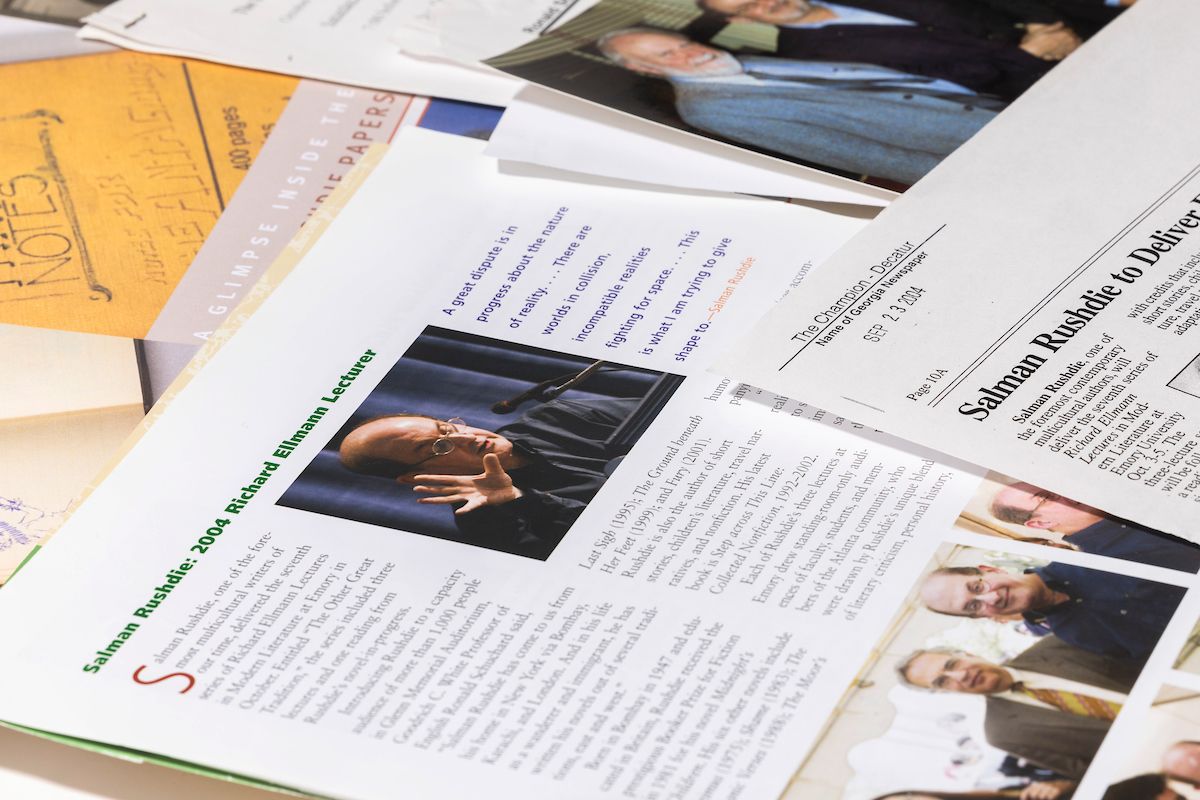
Rushdie concluded his time at Emory in 2015, serving as the Commencement speaker that year. Reflecting on his time here, he said: "It’s been a uniformly good experience. I’ve never really had an experience like this of being inside an academic institution over a long period of time — it’s the only time I’ve ever done it. And it’s been educational.”
Rushdie concluded his time at Emory in 2015, serving as the Commencement speaker that year. Reflecting on his time here, he said: "It’s been a uniformly good experience. I’ve never really had an experience like this of being inside an academic institution over a long period of time — it’s the only time I’ve ever done it. And it’s been educational.”
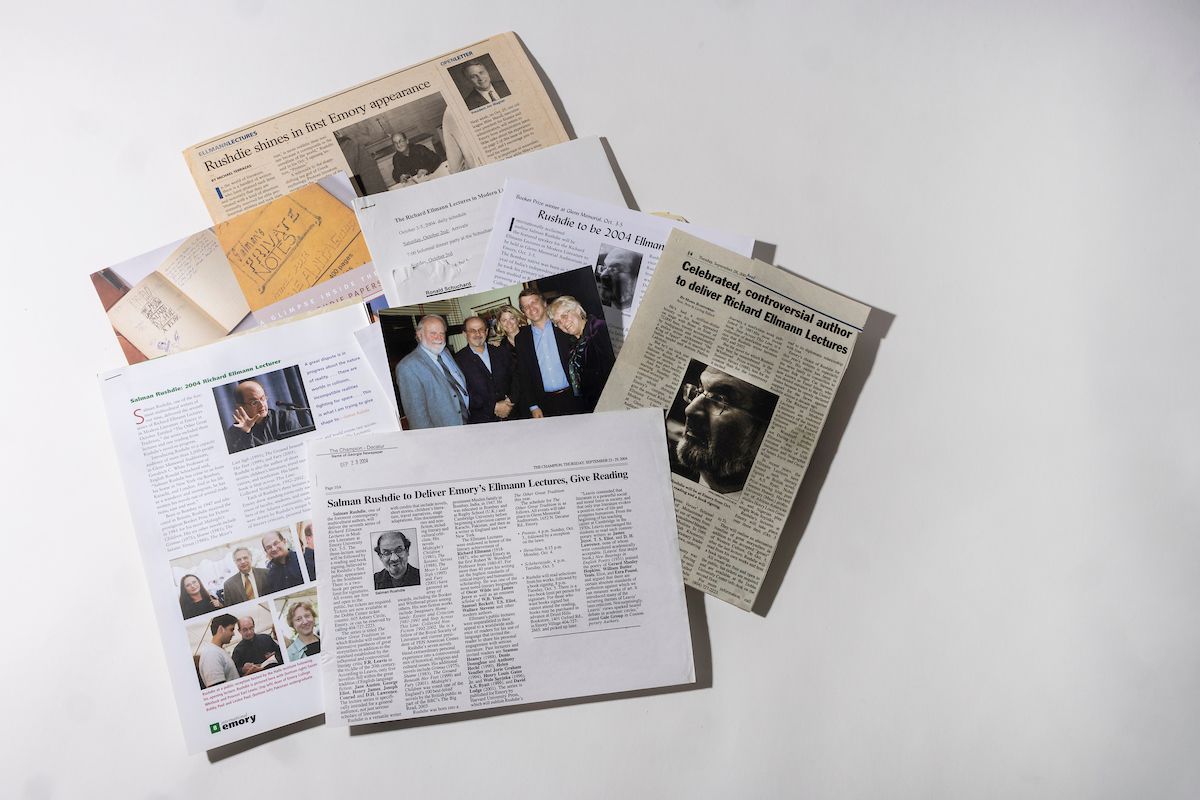
The Ellmann Lectures soon became a major event both in the life of the university and the Atlanta community. Annual ads in the New York Review of Books also created wider interest.
The Ellmann Lectures soon became a major event both in the life of the university and the Atlanta community. Annual ads in the New York Review of Books also created wider interest.
The lectures’ rise to prominence
Schuchard managed the myriad details of staging the lectures with a handful of graduate students and administrative assistants. The first lecture took place on April 13, 1988, Heaney’s 49th birthday.
From the start, Southern hospitality would reign. Schuchard roasted a pig in his backyard, had a mariachi band and a fountain for margaritas with 20 spouts so that “no one ever had to wait in line.” The strategy was simple: “When the lecturers were here, we would make them feel they were the most important person in the world,” says Schuchard.
Not only did the proceedings enchant the lecturers; they galvanized the campus.
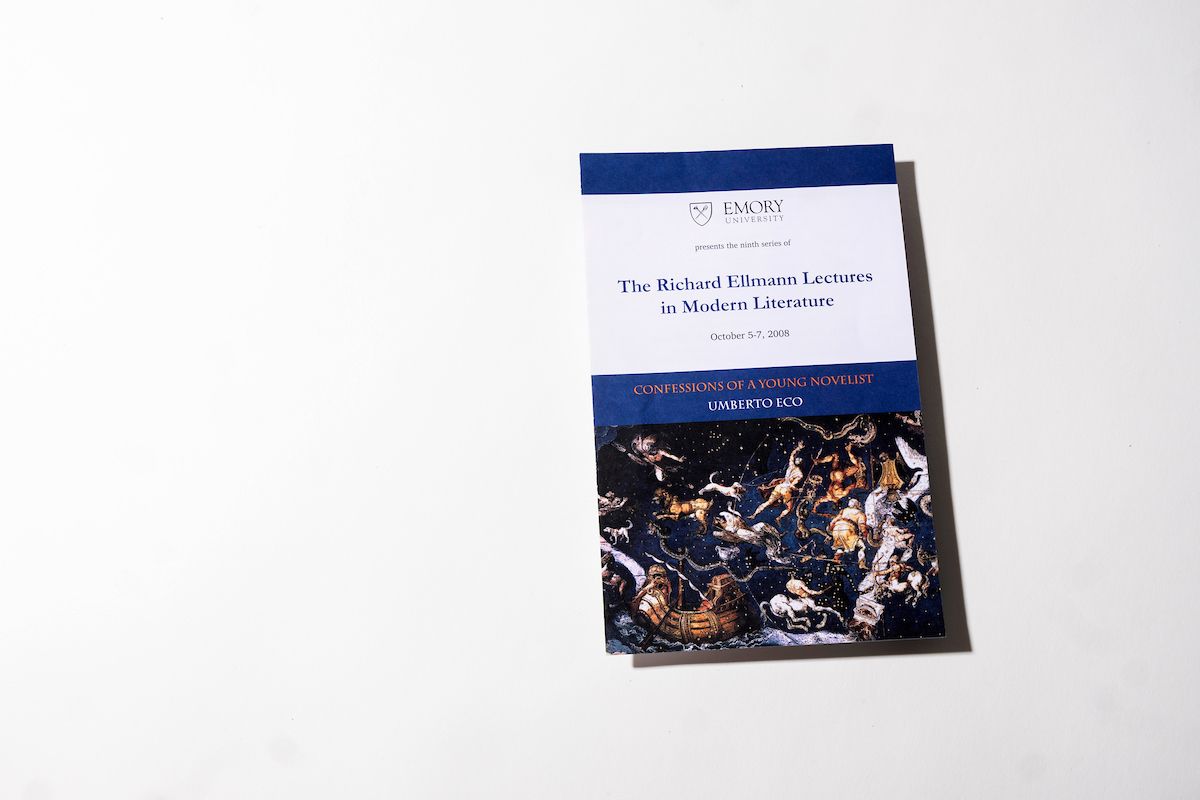
Umberto Eco's literary star rose in 1980 with the publication of "The Name of the Rose," a historical murder mystery set in an Italian monastery in the year 1327.
“Because we never had done anything like what we staged for the Ellmann Lectures, everyone was so hungry for it,” Schuchard observes. His goal was to engage the whole campus, and he succeeded. “It electrified me to see the Emory community assemble to hear one person speak the language well,” he says.
Word spread about the unique traditions. As Schuchard was encouraging novelist, short-story writer and critic A. S. Byatt to come, she drolly replied: “I’ll come if you do the pig.” For more on the lore of past lectures, see this 2018 essay by Schuchard.
Schuchard turned the lectures over to Joseph Skibell, professor of English and creative writing, in 2009. Skibell managed the well-received lectures of Margaret Atwood and Paul Simon.
“During my years as director, it was important to me to shift the geographical center of the Ellmann Lectures more to the American continent and to open up the concept of what literature is and was,” says Skibell.
“This was years before Bob Dylan won the Nobel Prize for Literature, so it seems that the world has caught up with Emory. And anybody who listens to Paul Simon’s most recent album, ‘Seven Psalms,’ will hear in its lyrics, and in the way the music supports those lyrics, the work of a master writer,” he adds.
“No one who was there,” says Higgins, “will ever forget Simon picking up his guitar and playing the opening chords of ‘The Sound of Silence.’”
Since that lecture, Higgins has been at the helm. She playfully notes, “I can think of my time here in human years or Ellmann Lecture cycles.” Byatt’s visit was her first exposure to the series. “I have been to many talks, but this is a different thing — to hear writers speak about issues vital to them. The lectures have always marked red-letter occasions for me at Emory.”

Umberto Eco's literary star rose in 1980 with the publication of "The Name of the Rose," a historical murder mystery set in an Italian monastery in the year 1327.
Umberto Eco's literary star rose in 1980 with the publication of "The Name of the Rose," a historical murder mystery set in an Italian monastery in the year 1327.
From Emory graduate student to Heaney scholar: an Ellmann Lectures story
Connections made at Emory constitute many of the high points of the career of Rand Brandes 85PhD, who retired as the Martin Luther Stevens Professor of English at Lenoir-Rhyne University in 2023 after 34 years.
Arriving at Emory in 1978 with an interest in Southern literature, Brandes ultimately focused on modern English and Irish poetry, his imagination fired by classes with Ron Schuchard and Richard Ellmann and the chance to develop what would become a decades-long friendship and professional relationship with Seamus Heaney.
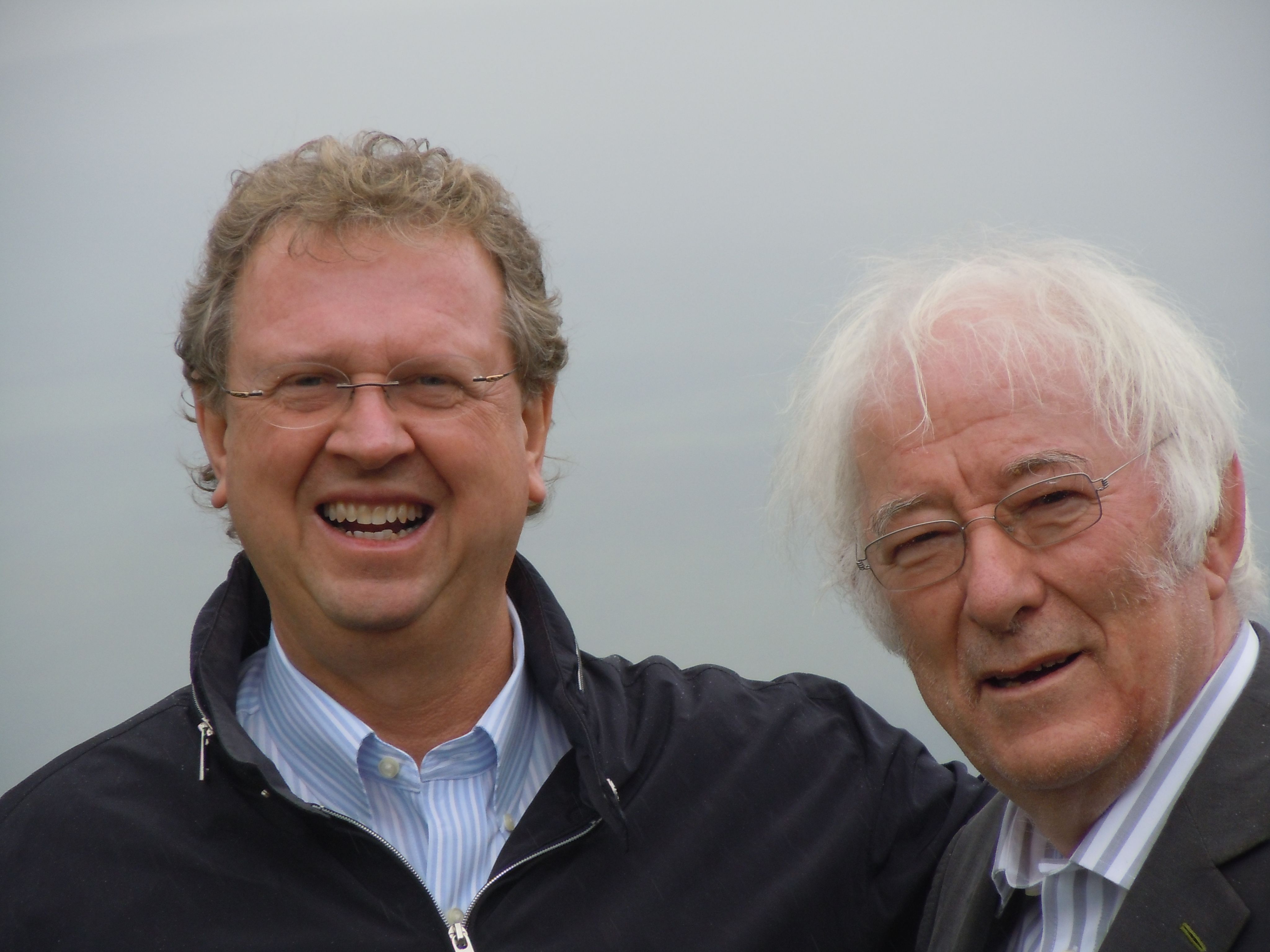
Rand Brandes (l) and Seamus Heaney in Dublin in 2012.
Rand Brandes (l) and Seamus Heaney in Dublin in 2012.
“As an initially nervous first-generation student at Emory, I sometimes could not believe the extent of the opportunities I had,” says Brandes. “Ron Schuchard took my writing to the next level. I took a class with Richard Ellmann on Yeats and Wallace Stevens; he made me feel the two things I was most looking for: welcomed and challenged. And then there was Seamus Heaney and the decades-long generosity he showed me.”
Brandes first met Heaney in 1981, but it was Heaney’s time as the inaugural Ellmann Lecturer in 1988 that provided an opportunity to solidify their relationship. To help out Schuchard, Brandes agreed to pick up Heaney from the airport. The conversation was so animated in the car, the two men determined that a pub stop was warranted. There, they talked about the work of poet Ted Hughes and about hailing from farm families even as they shared a love of dark humor.
Brandes and Heaney stayed in touch, running into one another at conferences, and Brandes sought out opportunities to hear Heaney read. As their friendship deepened, on trips to Ireland Heaney would host Brandes and his family, taking them to sites that appear in his poems.
“The first real test of our friendship came when my family and I arrived at the Heaney home in 1993 with a flotilla of suitcases,” Brandes recalls of the year that he spent in Ireland as part of a Fulbright residency. He was “motivated by a burning desire to protect the manuscripts” and so worked with Heaney in his attic organizing, documenting and preserving his manuscripts and archives.
“During this time, my admiration and respect for the poetry and the person grew exponentially. There was no separate code of conduct, capacity for caring or creative insight between the public poet and the private person,” Brandes says.
Though he wasn’t trained in archival work, Brandes learned on the job, taking disordered clippings of reviews and other materials from Heaney’s attic and from Faber, the poet’s publisher, on the road to becoming his foremost bibliographer.
In 1996, along with Michael Durkan, he published “Seamus Heaney: A Reference Guide.” Brandes followed that volume with “Seamus Heaney: A Bibliography, 1959-2003” in 2008 and “Seamus Heaney — A Life Well Written: Selections from the Collections of Carolyn and Ward Smith, Alan M. Klein and Rand Brandes” in 2014. A new edition of the bibliography is scheduled for 2025.
At one point, Heaney came to Lenoir-Rhyne to do a reading and refused, says Brandes, “the rather humble honorarium.” Taken with a rainstick Brandes had, Heaney accepted it as a gift and in 1993 published the poem “The Rainstick” in The New Republic with a dedication to Brandes and his wife.
It is one of the few poems in Heaney’s oeuvre bearing a dedication. Ten years after Heaney’s death, Brandes is still in touch with his family. The last three words of “The Rainstick” — “Listen Now Again” — are the title of the National Library of Ireland’s exhibition on Heaney, curated by Emory’s Geraldine Higgins. A traveling version of this exhibit will be on view in the Chace Gallery at the Schwartz Center from March 3-April 14 and is free and open to the public.
In an essay published in Irish Studies South in 2014, Brandes wrote: “Seamus made me the person I am today, someone who believes in the transformative power of poetry, of words arranged one by one as if one’s life depended upon it — as if all of our lives depended upon it.”
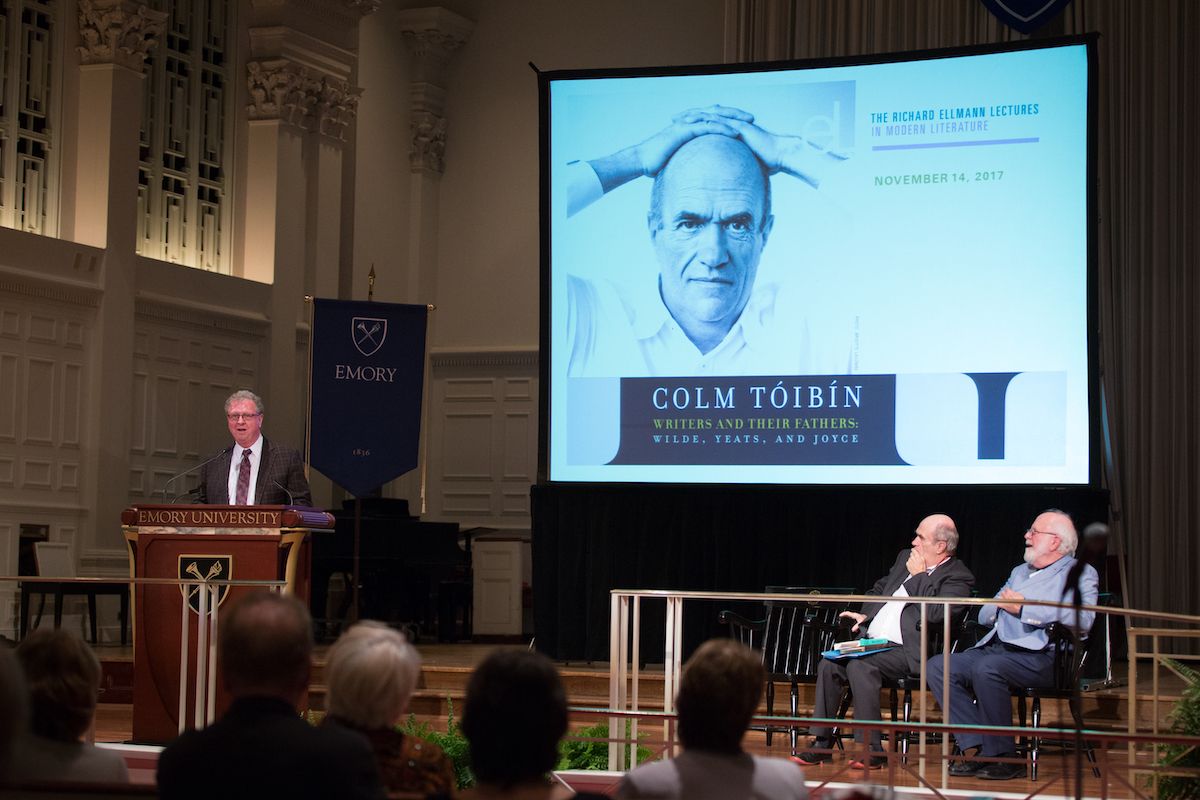
Lectures spur library acquisitions
The synergies between the Ellmann Lectures and the Rose Library cannot be overstated, beginning with the fact that Heaney decided to place his literary correspondence here in 2003, a purchase that enhanced Emory’s renowned Irish literature collection.
Another case in point is Salman Rushdie’s visit as lecturer. At Rushdie’s request, Schuchard arranged a tour of the Rose Library. It was clear that he was impressed, so when Schuchard brought Rushdie to meet then-President James Wagner at the Lullwater reception, he advised him: “Engage in the usual small talk about his travels here, then ask him: why doesn’t he place his papers at Emory?”
Wagner felt the enormity of it, but boldly posed the question. The deal and transfer were soon signed, sealed and delivered.
Rushdie placed not just his papers but his computer files at the Rose Library. From those laptops, library staff have pulled early drafts of some of his novels that Rushdie admitted to “having forgotten all about.” Moreover, he accepted a post as Distinguished Writer-in-Residence in the Department of English in 2006 and later served as University Distinguished Professor in Emory College of Arts and Sciences from 2011-15.
“The Ellmann Lectures have created moments of informality and serendipity when these incredible connections can be made,” says Higgins.
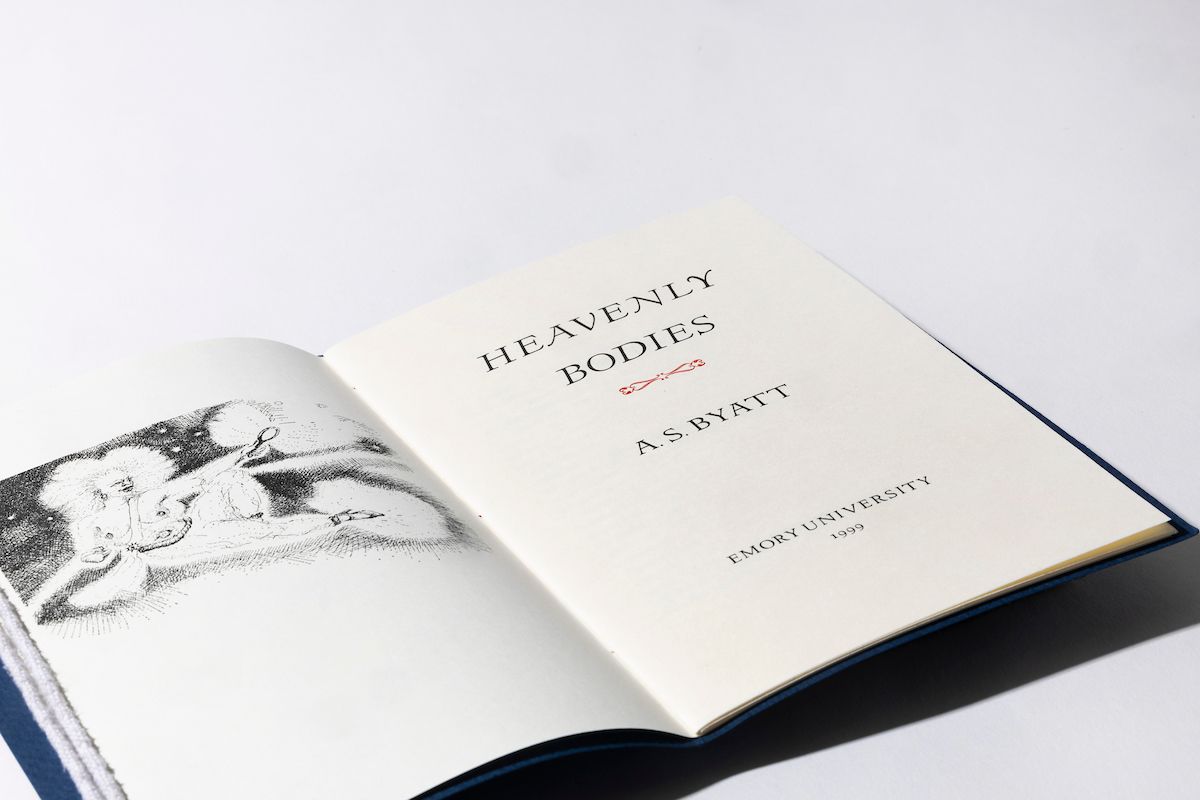
As a gift from Emory, each lecturer received one of these chapbooks — an elegantly designed publication of one of their works.
And it continues. Following his lecture, O’Toole plans to stay on, using the Rose Library for his work on Heaney’s biography.
Jennifer Gunter King, director of the Rose Library, notes: “The Ellmann Lecture series has been instrumental in shaping the Rose Library’s contemporary archives, highlighting literary legacies like Seamus Heaney and Natasha Trethewey through preserving letters, diaries, drafts, photographs, recordings and interviews. Through special lectures, like Ellmann, and having the archives open to the public, we at Emory have a unique opportunity to delve into the thoughts, processes and realms of writers, enriching our understanding of literature and the human experience.”

As a gift from Emory, each lecturer received one of these chapbooks — an elegantly designed publication of one of their works.
As a gift from Emory, each lecturer received one of these chapbooks — an elegantly designed publication of one of their works.
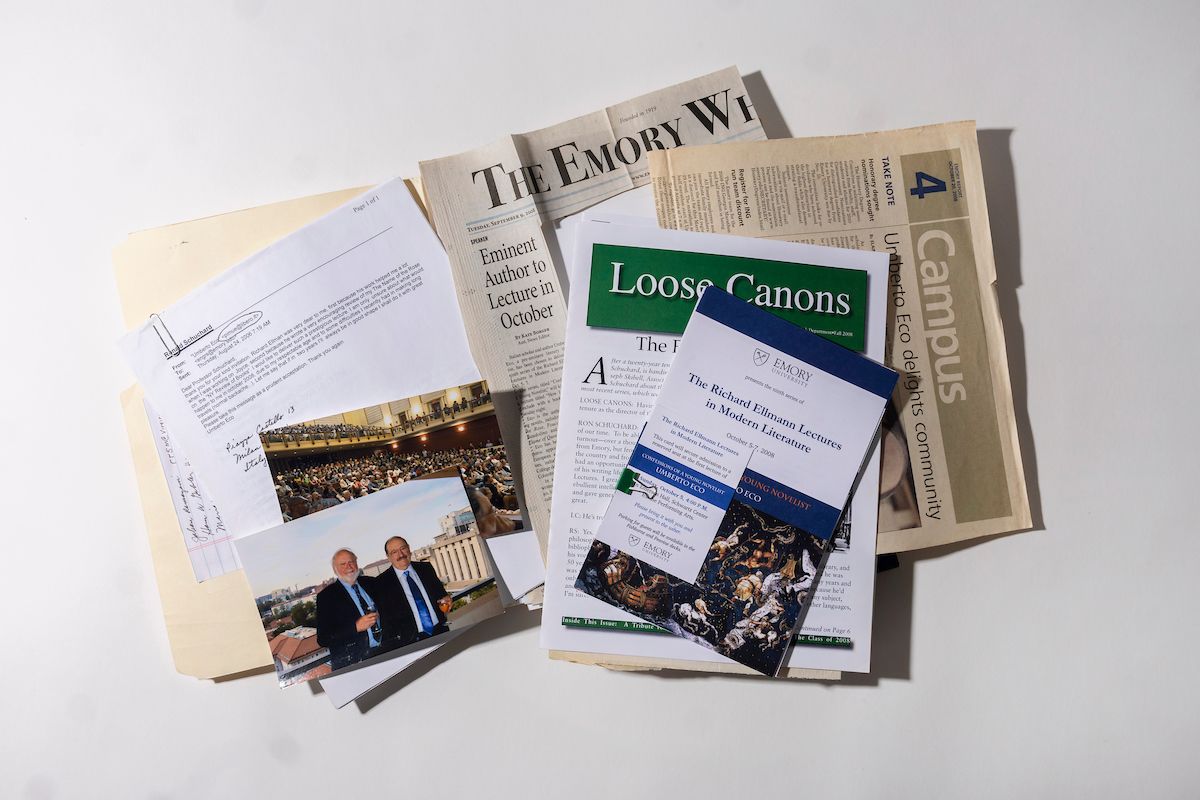
The Ellmann files maintained by Ron Schuchard are, thankfully, meticulous. In them, one sees receipts, invitations, programs and correspondence with the author as well as media coverage of the lectures.
The Ellmann files maintained by Ron Schuchard are, thankfully, meticulous. In them, one sees receipts, invitations, programs and correspondence with the author as well as media coverage of the lectures.
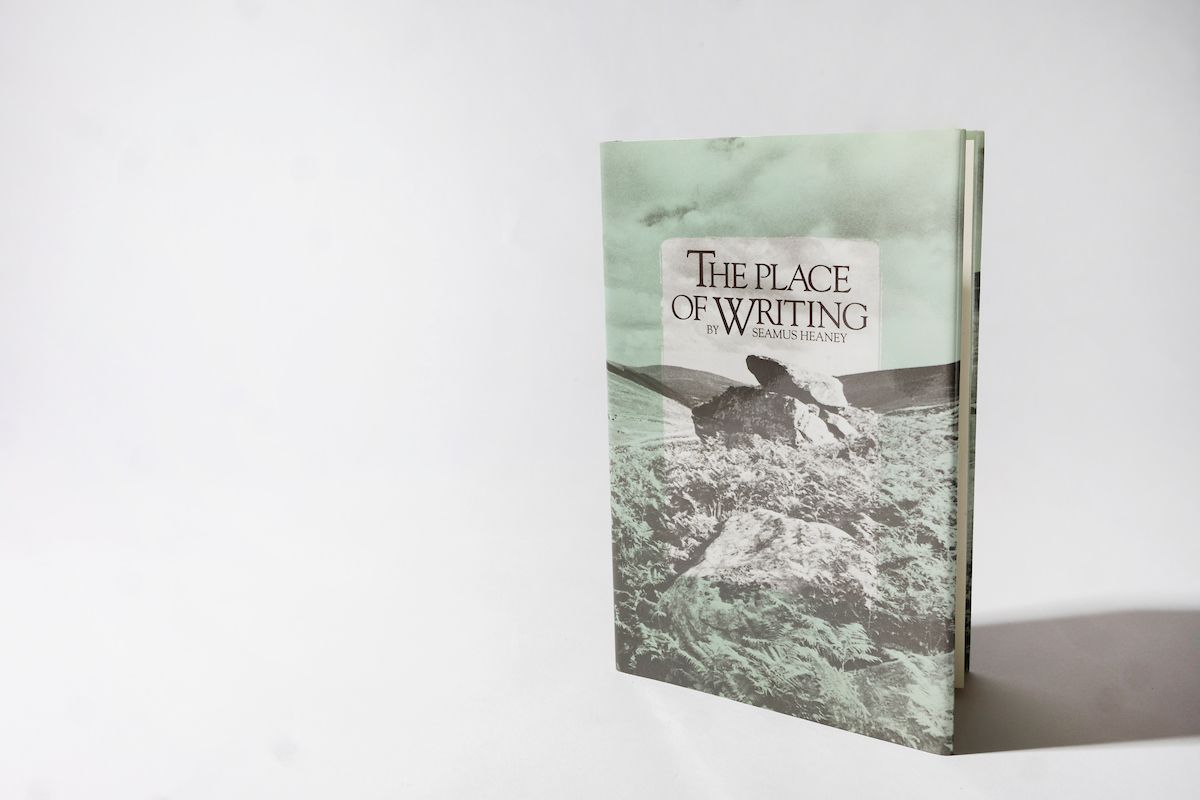
The book associated with the first Ellmann Lecture, delivered by Seamus Heaney. Scholars Press — then part of Emory — published "The Place of Writing."
The book associated with the first Ellmann Lecture, delivered by Seamus Heaney. Scholars Press — then part of Emory — published "The Place of Writing."
A chance to view the traveling Heaney exhibit
Coinciding with the Ellmann Lectures is a traveling version of the National Library of Ireland’s acclaimed exhibition “Seamus Heaney: Listen Now Again.” Curated by Higgins, the traveling exhibit will be on view in the Schwartz Center from March 3-April 14.
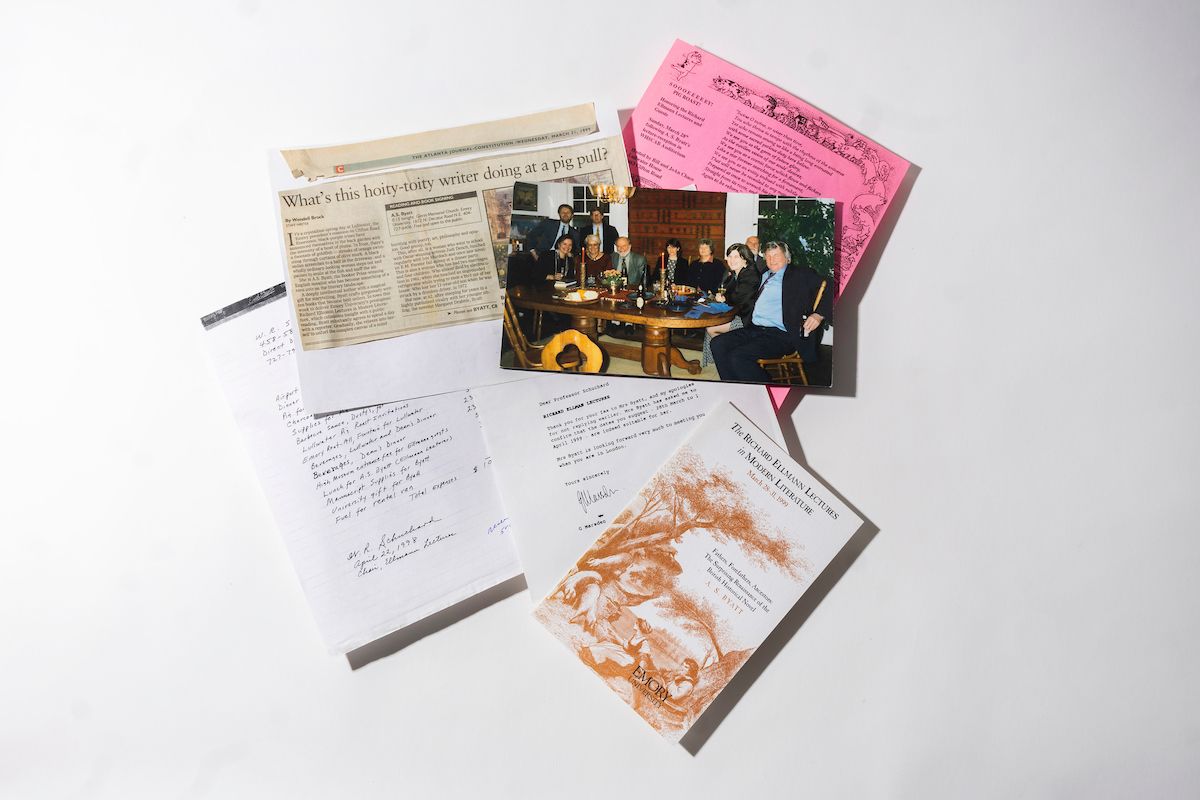
Items associated with A. S. Byatt's visit. Note the Atlanta Journal-Constitution's playful headline.
This is the second time Higgins has mounted a major exhibition in Heaney’s honor. In 2014, Higgins curated “Seamus Heaney: The Music of What Happens” at the Robert W. Woodruff Library, using manuscript drafts, rare illustrated books, photographs and even the surface of his old desk where he wrote some of his celebrated poems. O’Toole wrote about the exhibition for The Irish Times, and because Heaney died before the exhibition was completed, he noted that “what was intended to be a living celebration of the poet and his work instead has ended up as a fitting memorial.”

Items associated with A. S. Byatt's visit. Note the Atlanta Journal-Constitution's playful headline.
Items associated with A. S. Byatt's visit. Note the Atlanta Journal-Constitution's playful headline.
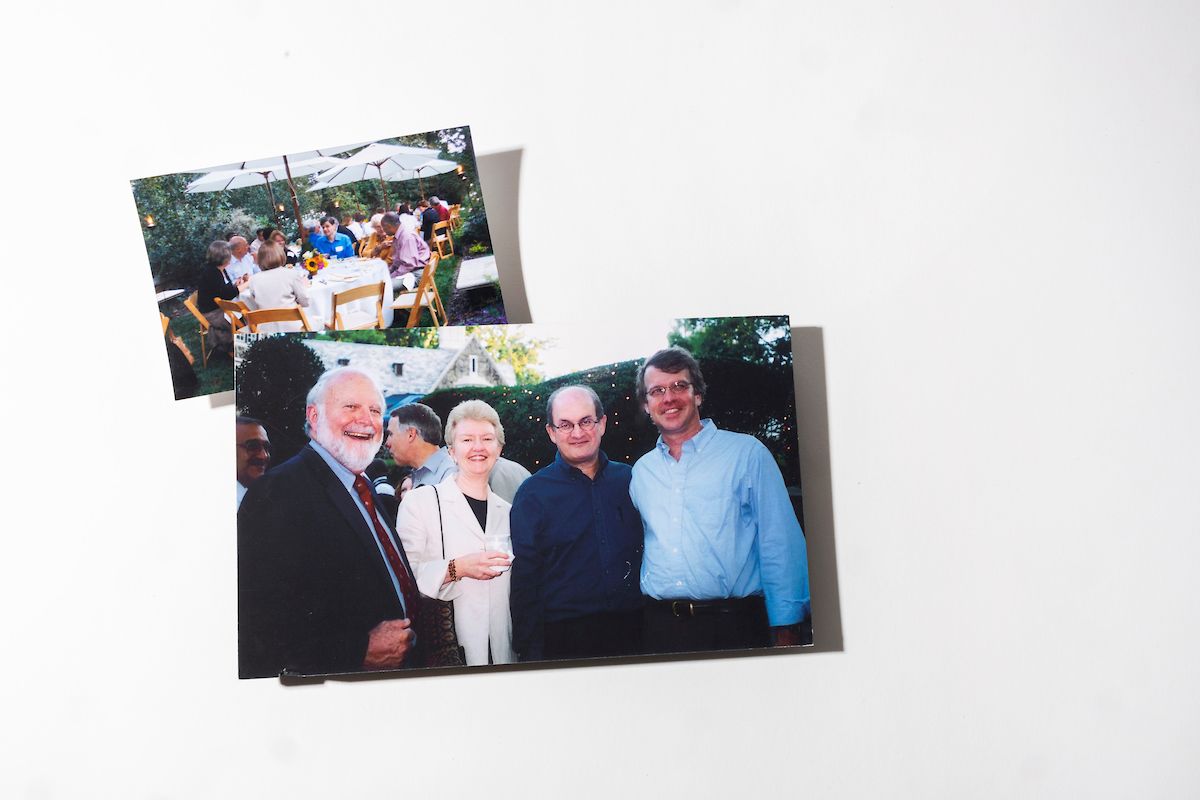
The Lullwater reception that took place during Salman Rushdie's time as Ellmann Lecturer. Alongside Ron Schuchard (l) and Rushdie are Linda Matthews, former library director, and Stephen Enniss, former head of Emory's special collections.
The Lullwater reception that took place during Salman Rushdie's time as Ellmann Lecturer. Alongside Ron Schuchard (l) and Rushdie are Linda Matthews, former library director, and Stephen Enniss, former head of Emory's special collections.
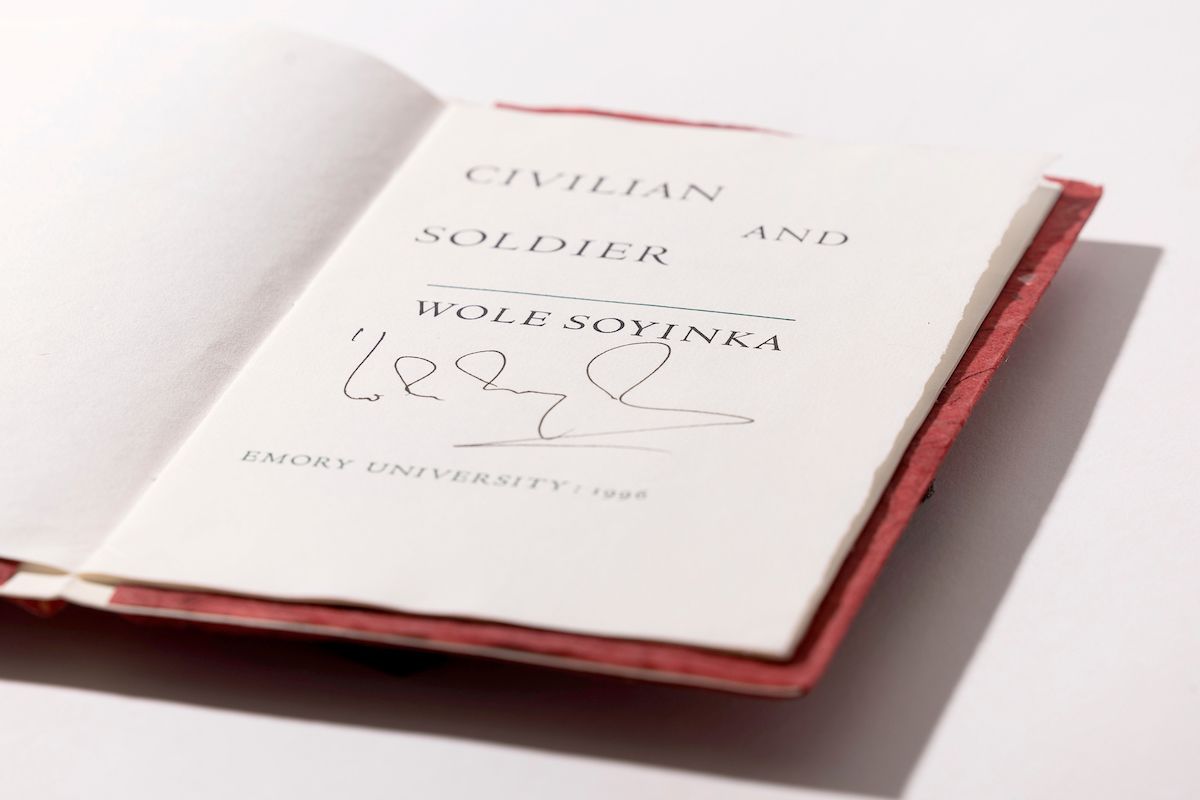
When historian Henry Louis Gates Jr. lectured on "The Art and Politics of Wole Soyinka" in 1996, he brought along the Nobel Prize-winning Nigerian playwright.
When historian Henry Louis Gates Jr. lectured on "The Art and Politics of Wole Soyinka" in 1996, he brought along the Nobel Prize-winning Nigerian playwright.
Experience three days of literary bliss
As the impressive history of the Ellmann Lectures attests, the decades-old, late-Sunday scramble to have Richard Ellmann lecture here has paid off mightily, in ways that even Schuchard might not have imagined. Reserve your tickets through the Ellmann Lectures site to be part of inscribing the next chapter.
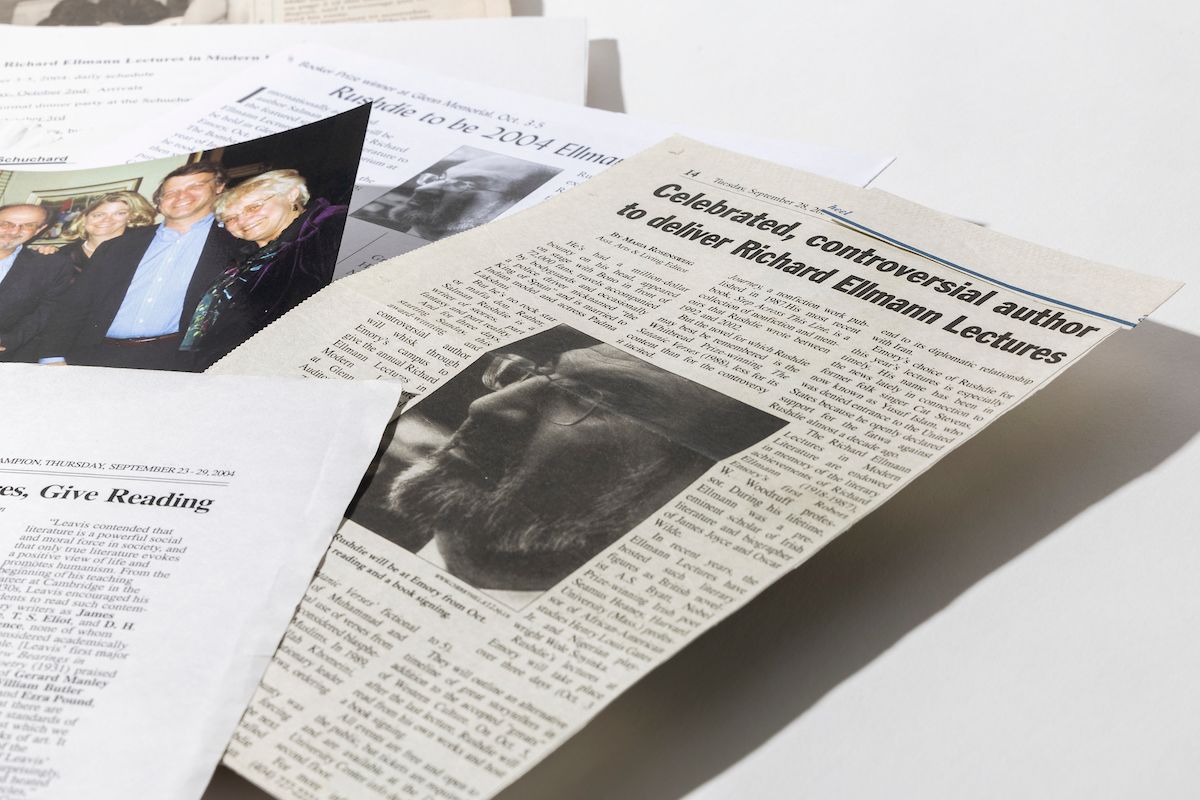
Having set high standards for the execution of the Ellmann Lectures, founding director Ron Schuchard playfully says: "If I made an appointment and didn't stay long, I had good success talking to our presidents about support."
“The Ellmann Lectures mark a high point of an artist’s career. There is a palpable intellectual drawing power in the people we bring — writers like Trethewey and O’Toole — that has something for everyone at the university,” says Schuchard.

Having set high standards for the execution of the Ellmann Lectures, founding director Ron Schuchard playfully says: "If I made an appointment and didn't stay long, I had good success talking to our presidents about support."
Having set high standards for the execution of the Ellmann Lectures, founding director Ron Schuchard playfully says: "If I made an appointment and didn't stay long, I had good success talking to our presidents about support."
Previous Ellmann Lectures
2019: MODES OF DISRUPTION: LITERARY AND VISUAL INTERVENTIONS
Claudia Rankine
2017: WRITERS AND THEIR FATHERS: WILDE, YEATS AND JOYCE
Colm Tóibín
2013: THE INSOMNIAC'S LULLABY: AWAKE AND AWARE OF THE TIME
Paul Simon
2010: IN OTHER WORLDS: SF AND THE HUMAN IMAGINATION
Margaret Atwood
2008: CONFESSIONS OF A YOUNG NOVELIST
Umberto Eco
2006: THREE MASTERS: CERVANTES, BORGES AND ORTEGA Y GASSET
Mario Vargas Llosa
2004: THE OTHER GREAT TRADITION
Salman Rushdie
2001: CONSCIOUSNESS AND THE NOVEL
David Lodge
1999: FATHERS, FOREFATHERS, ANCESTORS: THE SURPRISING RENAISSANCE OF THE BRITISH HISTORICAL NOVEL
A. S. Byatt
1996: THE ART AND POLITICS OF WOLE SOYINKA
Henry Louis Gates Jr.
1994: THE BREAKING OF STYLE
Helen Vendler
1990: BEING MODERN TOGETHER
Denis Donoghue
1988: THE PLACE OF WRITING
Seamus Heaney
Written by Susan M. Carini 04G. Designed by Ruby Katz. Photos by Emory Photo/Video.
Related Stories
Songwriter Paul Simon brings a new verse to the Ellmann Lectures
Resources
Emory News Center | Emory University

